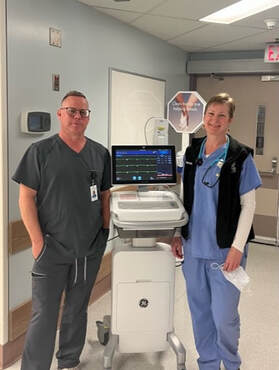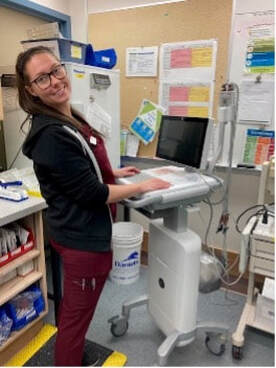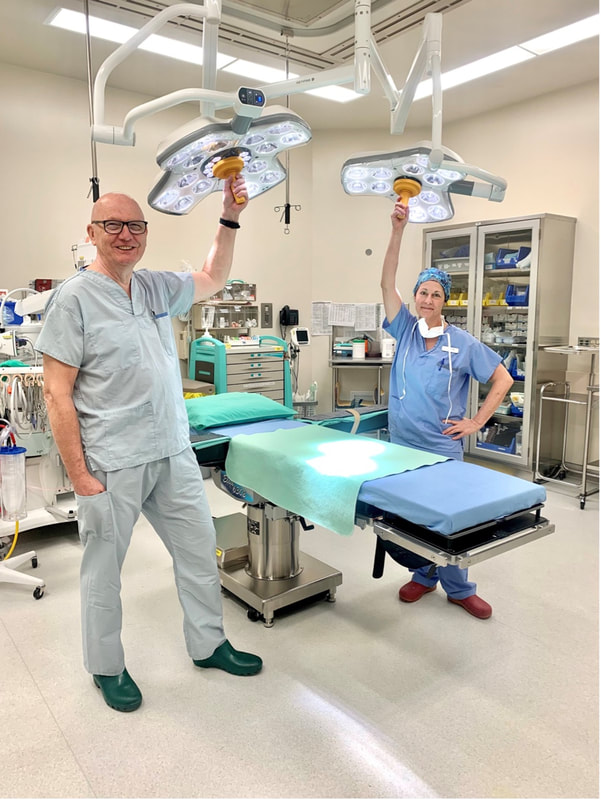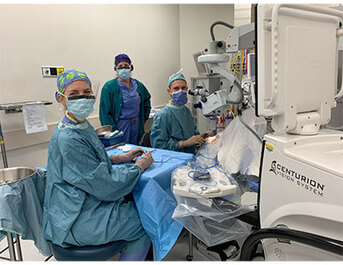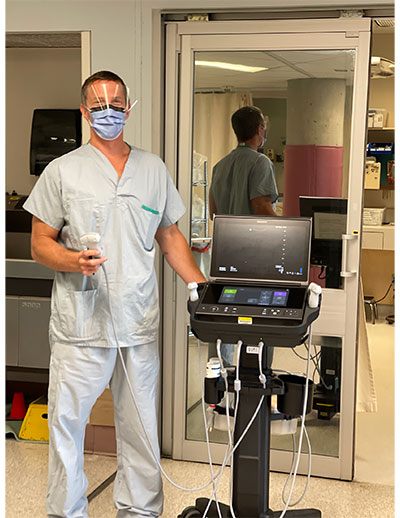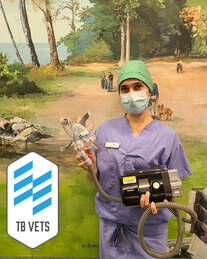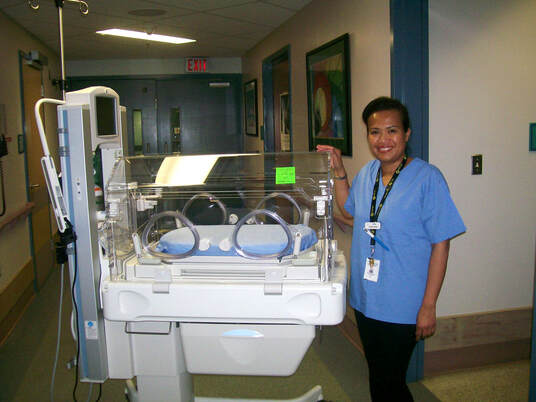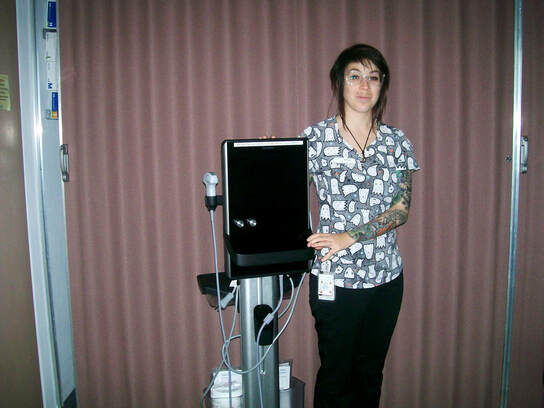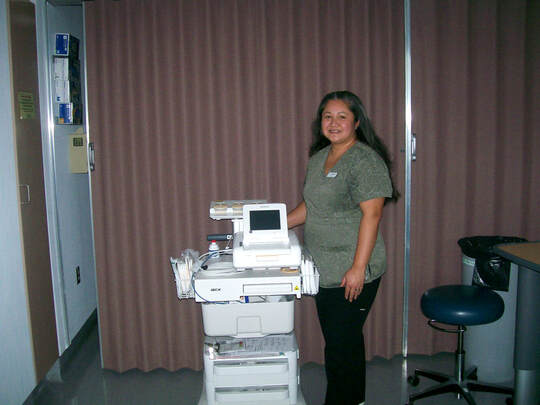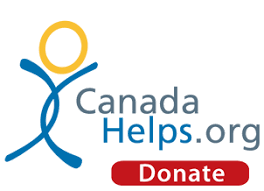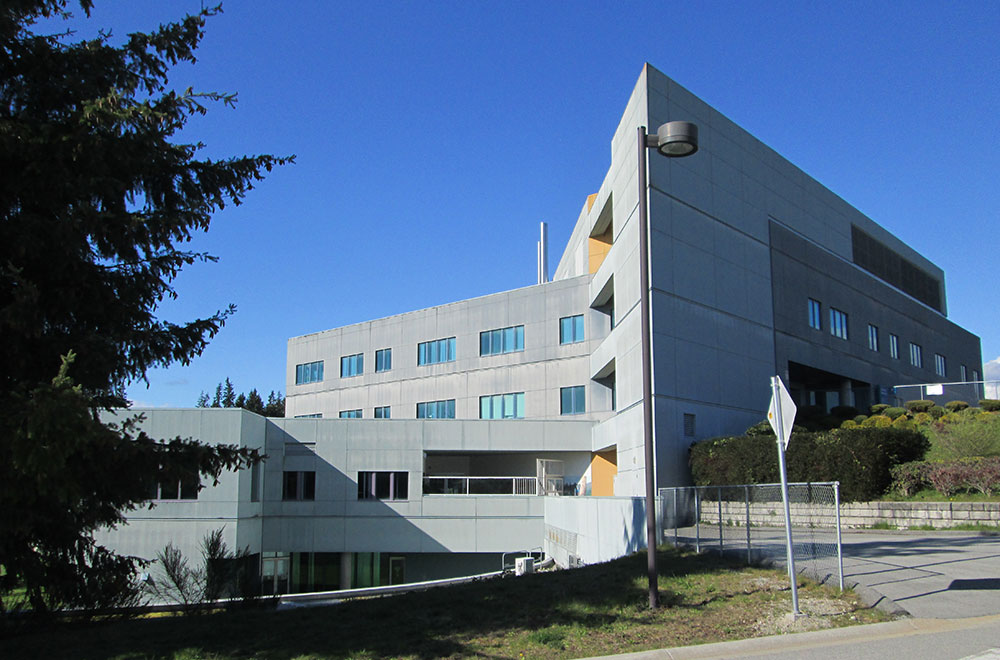|
The Spring 2023 update of the Donor Wall in the hospital lobby saw the names of Don Villani and Petros Kamiliris entered at the "over $20,000" level in recognition of their generous donations to the Hospital Foundation. We were also the recipient of a bequest of $270,000 from a friend of the Foundation. Recent equipment purchases approved in June 23 were
Thank you to the congregation of the Faith Lutheran Church for a donation that enabled the purchase of two Electro Cardiograph Machines. Pictured below are RNs Stephen Shortridge and Heather Muzyzlowski with an ECG cart in the critical care department and LPN Jennifer Salisbury with the second ECG machine on the ward. The new lighting in both operating rooms has been successfully installed. Significant scheduling effort was required from project staff to coordinate availability of the electrical contractor with downtime in the operating rooms. Pictured is general surgeon Dr. Pawel Makarewicz and OR nurse Cindy Pankiw with the new lights in May 2023.
The Foundation would like to send our heartfelt thanks to The John and Barbara Armour Charitable Foundation for their recent generous donation to the Hospital Foundation.
We also extend special recognition again to Robert Lacey, a long time resident and donor, for a recent donation from The Robert Lacey Charitable Gift Fund. These donations were received through the services of Gift Funds Canada. New Operating Room Equipment At the January 27, 2022 Hospital Foundation meeting the Directors approved $186,000 to fund new operating room equipment. New lighting will be provided for both operating rooms. The current operating room lighting is 30 years old, having been installed with the original hospital construction in 1993. The new lighting will be more efficient and will provide a brighter environment for those working in the operating rooms. A Rapid Infuser and an Arctic Sun Warming-Cooling Unit will also be purchased with this funding. A Rapid Infuser provides high-speed delivery of warmed blood and fluids to patients. This is often critical during trauma and emergencies. It is a leading medical device to combat hypothermia and blood loss. The Arctic Sun warming-cooling unit is used to induce a "mild hypothermic state" in patients. Studies have shown that slowing the body's metabolic processes by therapeutic hypothermia in patients who are experiencing insufficient blood flow due to cardiac arrest, stroke or brain trauma can increase the chance of a good outcome by 30 to 40 percent. This is a non-invasive system that will also re-warm patients in a controlled manner. New Neonatal Monitor The Foundation also approved funding of $21,000 to purchase an Intellivue Neonatal Monitor for the maternity department. The particular model to be purchased will provide remote monitoring of mother and baby away from the bedside, which will allow freedom of movement for patient while still being monitored by nurses.
This year, in 2021, the Foundation was able to commit $216,000 to purchase equipment and training. Most of the equipment has now been delivered although two medical air dryers have been delayed due to the current global issue in shipping. Two major pieces of equipment were purchased to replace machines that were malfunctioning and nearing the end of life. The cataract surgery team was doing 13 cases a week and over 50 cases per month when the old cataract machine gave up the ghost. A loaner machine from Lions Gate hospital filled the gap until a new machine purchased by the Foundation was delivered in January 2021. And the Emergency Room ultrasound machine had to be replaced when it began losing power when unplugged which made it difficult to perform bedside ultrasounds. The replacement was received in May 2021. All donations to the Powell River Hospital Foundation are used to purchase equipment and training for the hospital and extended care facilities. The Foundation's operating costs are paid from the interest earned on our endowment fund, not from charitable donations. New Equipment from TB Vets Charitable Foundation
The Powell River General Hospital is ready to handle an influx of COVID-19 patients. But so far Powell Riverites have been successful in limiting the spread of this influenza. We hope that physical distancing, mask wearing and isolating those who are infected will continue to prevent a rise in numbers of infections in our community.
Increased infection control measures have to be maintained so that the virus doesn’t get a foothold in the hospital or the Evergreen and Willingdon Complex Care facilities as well as in other vulnerable locations in the community . The Foundation is grateful for the support and commitment that our community is displaying as we all rally to manage COVID-19. We need to continue to "do as we have been doing" through this Winter and into the Spring of 2021 until a vaccine is developed and we can all gain immunity. The Foundation committed $208,000 to the purchase of equipment for the hospital in the fiscal year ending September 30, 2020. Equipment worth $85,000 was delivered and paid for in the year, including a second infant incubator ($26,000) and an Intensive Care bed ($40,000). The remaining equipment has been delivered and we are awaiting invoicing. This includes:
Bladder Scanner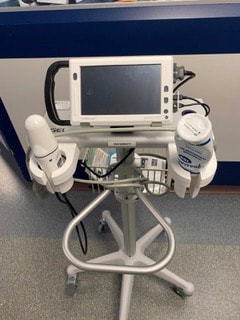 Earlier in the year the Foundation committed to provide funding for training in Pediatric Advanced Life Support (PALS). This training requires bringing in specialists from out of town. However it has been postponed due to the COVID-19 pandemic. PALS training prepares staff to recognize and intervene in pediatric cardiovascular arrest or other emergency presentations. The goal is to develop a high performance team who can apply systematic approaches to the assessment and treatment of seriously ill or injured children. With the generous support of donors in our community the PR Hospital Foundation was able to purchase six pieces of major medical equipment for acute care in the hospital in 2019 totalling $169,614. The equipment shown here went to the maternity department where the medical team there is now better prepared to care for multiple seriously ill mothers and babies until transport can be provided to Children’s Hospital in Vancouver.
|
Current Projects:
The Foundation funds equipment and training. 
Archives
September 2023
PR Hospital Foundation
5000 Joyce Avenue Powell River, BC V8A 5R3 (604) 485-3211 Ext 4349. [email protected] Charitable Reg # BN: 130877426RR0001 |
